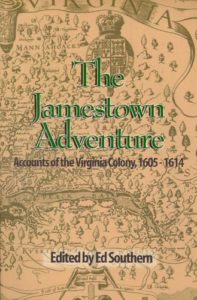He Had His Liberty
266 words.
Originally posted on my writing blog which was active from 2010 to 2018.

What does “he had his liberty” mean? Say, in the early 17th century?
I came across it reading Edward Wingfield’s account of his removal from the first Council in Jamestown in 1607, in the book The Jamestown Adventure. (Edward Wingfield could be considered the first elected governor of Virginia. Or the first elected president of North America. Or something along those lines.)
“… Mister Kendall, taken from thence, had his liberty, but might not carry arms.”
I am not sure what that means. Does that mean George Kendall was set free or that he was executed? “Liberty” would sort of imply the former, but maybe it means, you know, liberty from this mortal coil. Or something Shakespearean like that. I am confused because I thought that Kendall was executed in Jamestown. Maybe it means he had a trial. Maybe it was a trial by dueling pistols, but they didn’t allow him to have a pistol (“but might not carry arms”).
I Googled for other examples, and they all seem equally ambiguous.
I hate it when the Internet does not contain the knowledge I seek.
Oh, Wikipedia says George Kendall was executed by firing squad … but a year after Wingfield was removed, so that doesn’t really fit the above events. (Wikipedia, just so you know, is awful about the details of early Jamestown. Dates and names and places are all over the map.)
Wait, now I think I understand. Kendall was set free, but he was not allowed to carry a weapon afterward. Then, a year later, he did something else which got him executed. Maybe?
Sorry, new comments are disabled on older posts. This helps reduce spam. Active commenting almost always occurs within a day or two of new posts.